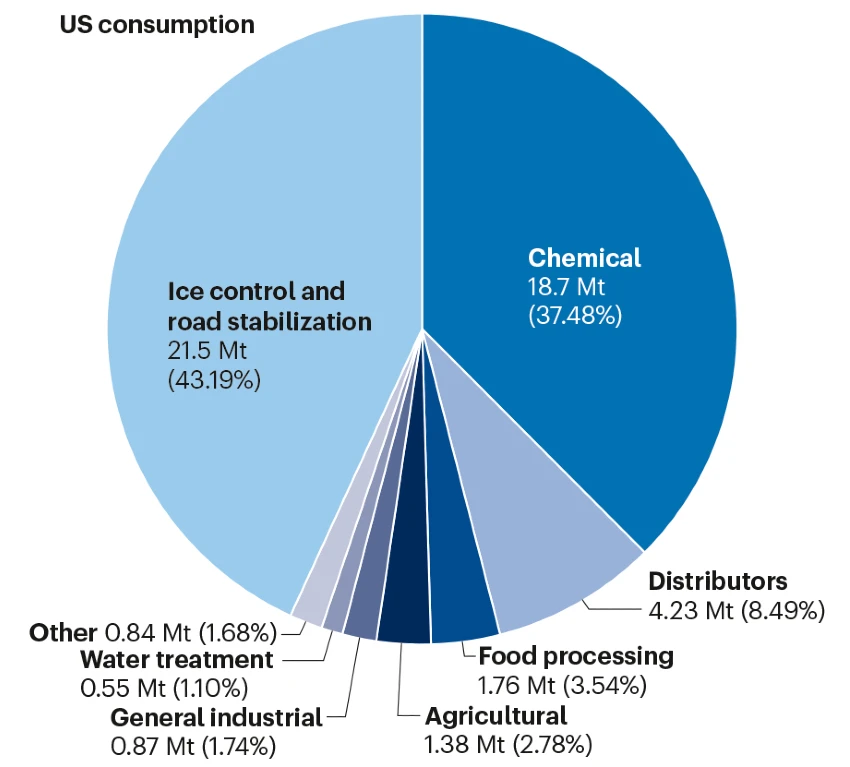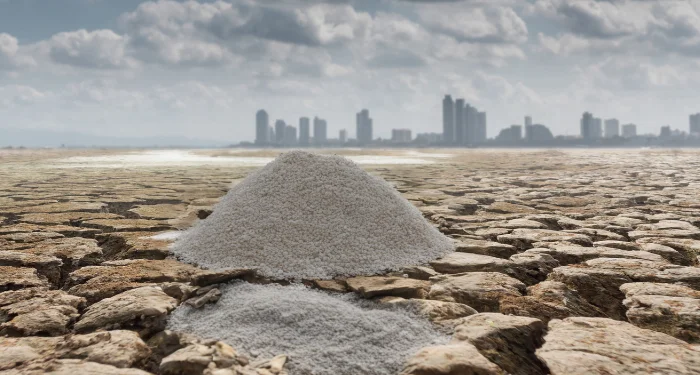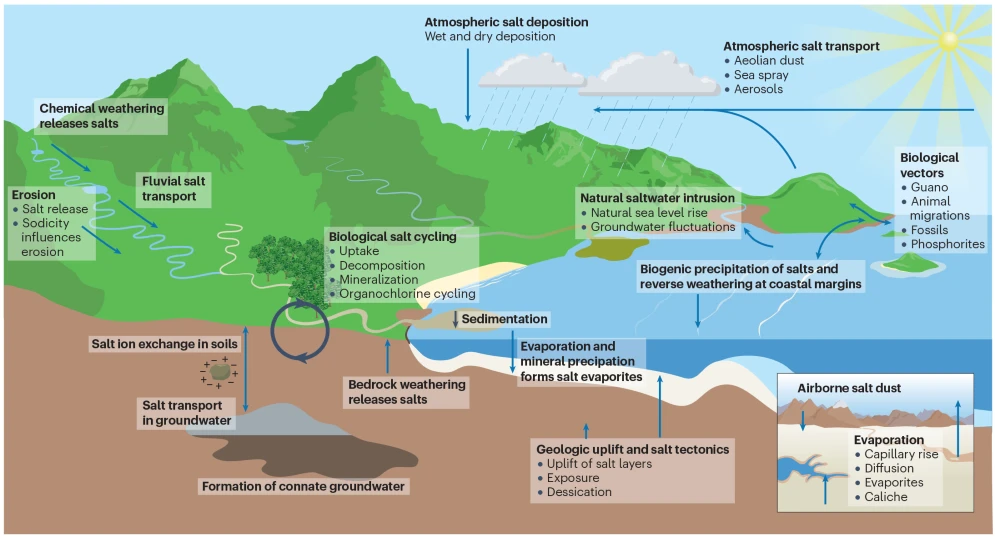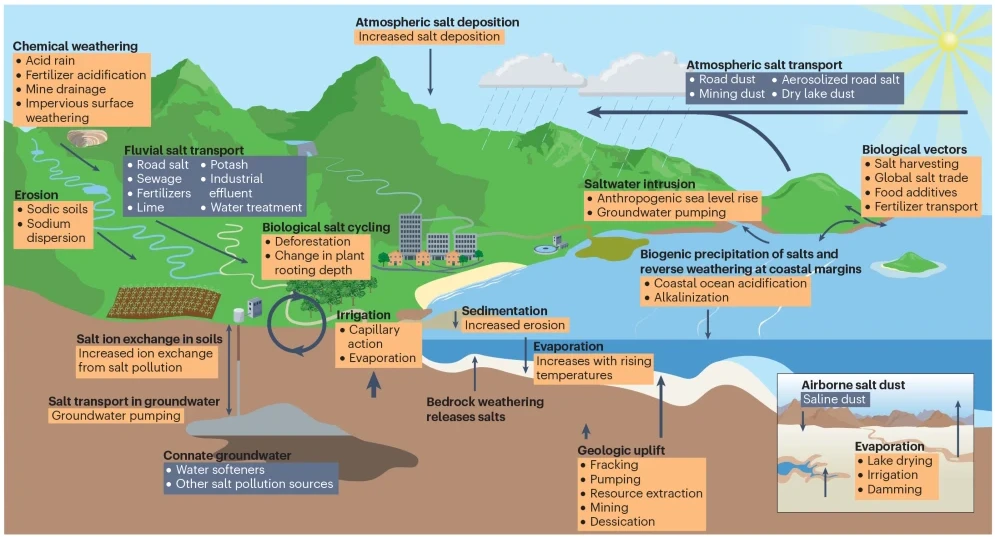Imagine the Earth as a giant living being. Professor Sujay Kaushal from the University of Maryland likens our planet to a creature that could get really sick if it has too much salt. His recent study, featured in the respected journal Nature Reviews Earth & Environment, shows that we humans are shaking up Earth’s natural salt balance—and not in a good way.
Professor Kaushal, who’s also part of UMD’s Earth System Science Interdisciplinary Center, explains that while Earth naturally moves salts around over long periods, our human actions are speeding up this process, big time.
Think about all the things we do: mining, building stuff, farming, treating our water and roads—these activities are making our soil, water, and even the air salty.
This is bad news for the animals and plants that need fresh water to survive, and it could make our drinking water risky to gulp down.
Kaushal gets into the nitty-gritty, saying, “If you think of the planet as a living organism, when you accumulate so much salt it could affect the functioning of vital organs or ecosystems.” He’s worried because getting rid of salt from water is super tough and costly, and it leaves behind a salty mess that’s even saltier than ocean water.
Here’s the kicker: for the first time, Kaushal and his team are saying that humans have messed with the salt levels on Earth so much that it’s affecting everything around the globe.

Gene Likens, another scientist who worked on the study, chimes in with how they’ve moved from looking at salty spots in places like New York to realizing that humans have thrown a wrench in the whole salt cycle of our planet.
The study isn’t just about table salt—there’s a whole bunch of different salts underground and in water. And when we mess with these salts, like the kinds from limestone or gypsum, we can cause some serious environmental headaches.
Kaushal and his team have crunched the numbers and found that human-caused saltiness has touched a whopping 2.5 billion acres of dirt across the globe. That’s as big as the entire USA! Streams and rivers are getting saltier too, and it’s all happening as we use and produce more salt than ever before.
Salt isn’t just staying on the ground, either. In some places, lakes are shrinking and puffing out clouds of salty dust, while in snowy areas, the salt we use on roads can float into the air and mess with the quality of the air we breathe.
The chain reaction doesn’t stop there. Salty dust can make snow melt faster, which is a problem for places that depend on snow for water. And because salt can stick to other bad stuff in the soil, it can create toxic mixtures that are harmful to us and the environment.
Professor Kaushal gives us a real-life example, saying, “Salt has a small ionic radius and can wedge itself between soil particles very easily. In fact, that’s how road salts prevent ice crystals from forming.” He points out that in the U.S., road salts are a big deal—they make up almost half of the salt we use and are a major player in making our waters salty.
To keep our water clean, Kaushal suggests we might want to cut down on road salts or find something else that works. Some places, like Washington, D.C., are already trying out beet juice on icy roads, which does the job with way less salt.

Kaushal doesn’t want us to forget that while road salts help us avoid slipping and sliding in winter, we must think about the future too.
“There’s the short-term risk of injury, which is serious and something we certainly need to think about, but there’s also the long-term risk of health issues associated with too much salt in our water,” he cautions.
It’s all about striking a balance.
The study ends with a big idea: we should set a limit for how much salt is okay for Earth, kind of like how we have limits for CO2 to keep climate change in check.
More To Discover
- Atlantic Circulation At High Risk: Possible Collapse of Atlantic Currents Could Unleash Havoc on Europe
- Antarctica’s Ice Melt Matters: A Disappearing Act with Global Consequences
- China’s Broken Climate Promises: Emissions Surpass US, EU, and India Combined
- US Heat Pump Manufacturers Triumph in Cold Climate Challenge, Promising Eco-Friendly Home Heating
Kaushal admits that managing salt will be tricky since it’s not currently seen as a water pollutant in the U.S., but he’s certain it’s a growing problem. “But do I think it’s a substance that is increasing in the environment to harmful levels? Yes,” he states firmly.
Source: Nature





















